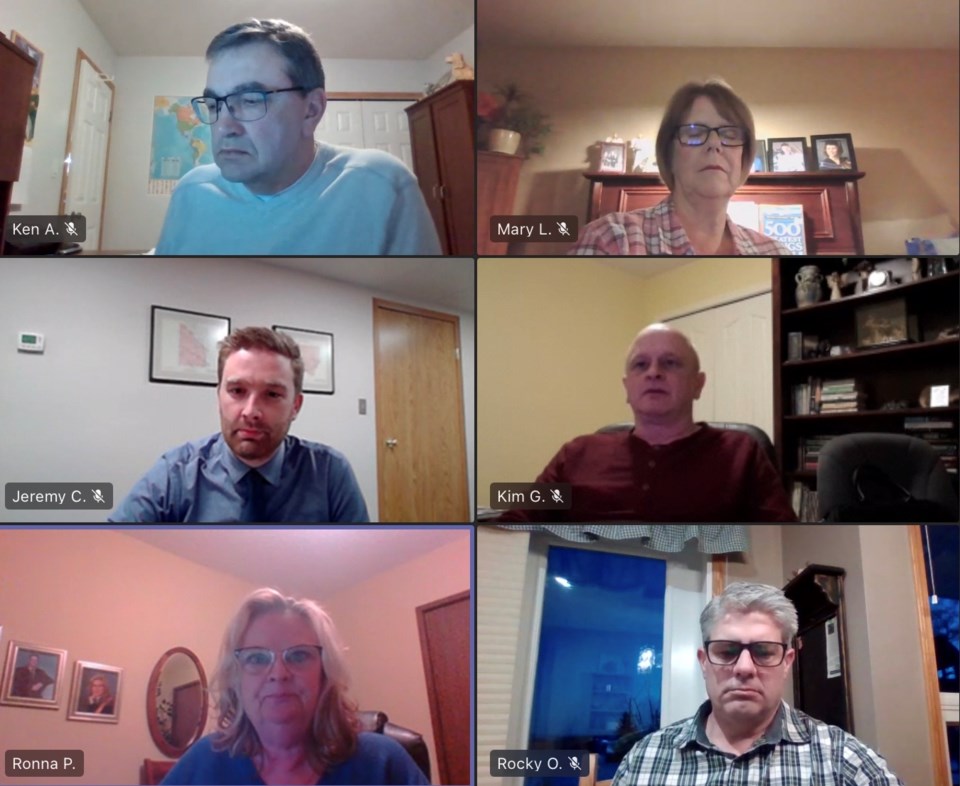A wide range of concerns were discussed Wednesday night as Living Sky School Division board met the area’s Saskatchewan Party MLAs.
The board meeting included four MLAs as guests — Jeremy Cockrill of the Battlefords, Ryan Domotor of Cut Knife-Turtleford, Randy Weekes of Biggar-Sask. Valley and Ken Francis of Kindersley. Invitations had also gone to Premier Scott Moe of Rosthern-Shellbrook and Jeremy Harrison of Meadow Lake, but they were not able to attend.
The school board meeting with MLAs usually happens on an annual basis, but this one was notable because of the large number of new faces at the table. Both Cockrill and Domotor are brand new MLAs and the ten-member Living Sky board itself has five new trustees, so for them it was as much a chance to get to know one another and their concerns for the first time.
Even more notable was that this particular MLAs meeting was the first to be conducted entirely virtually on the Microsoft Teams platform due to COVID-19 pandemic restrictions.
Not surprisingly, the pandemic and all the issues the school board faced in dealing with it came up frequently during the meeting. But board chair Ronna Pethick expressed pride in the division’s staff for how they worked to ensure students “continue to learn, continue to succeed and continue to grow,” all the while keeping them safe.
“We have an amazing staff in the school division and something the board is very proud of,” said Pethick.
It was school division officials who did most of the talking at the meeting, and a lot of ground was covered during the almost two-hour long meeting. Here are some highlights from their presentation to the MLAs:
Funding:
The division thanked the province for the pandemic funding, with funds going towards more caretaking time to keep schools clean. The funding also was able to sufficiently staff their virtual school.
Their budget nevertheless decreased by $160,000 with $130,000 of that loss coming in Supports for Learning.
Their presentation showed total funding for Supports for Learning had dropped by $800,000 nominal dollars compared to 2013-14.
The main issue the division had in this area was with changes to the funding formula which tied more of the funding for intensive supports to overall enrolment instead of to identified school needs. The point was made that this favoured the larger school divisions. This was an issue the division had raised previously in meeting MLAs.
As for overall funding, school division officials made the point that they have tightened their belts in recent years including staff reductions, and that it was getting harder and harder to find efficiencies.
“It’s getting tougher to do this,” said director of education Brenda Vickers. She also noted rural school divisions like theirs have higher per-student fixed costs.
Post-COVID concerns:
Also raised at the meeting were concerns about the uncertainty of what would happen post-pandemic. It was noted several practises put in place during the pandemic restrictions, including cleaning and so on, were likely to continue and would need continued funding.
As well, they cited the need to continue funding their virtual programming. About 350 students currently attend LSSD Virtual, and it was uncertain when they would return to the live classroom.
Mental Health:
The mental health challenges of COVID-19 were also raised at the meeting. The division reported to MLA that their OurSchools data indicated higher levels of anxiety among their students compared to the Canadian norm.
They also reported that school counsellors noted higher instances of drug and alcohol use, domestic violence, financial stress, grief, body image and eating disorders, tension in the home, and COVID-related anxiety.
In his response to the presentation, Weekes noted that budget discussions were already under way in Regina, with the budget coming on April 6.
“This is a good time for us to take this information back to caucus and see what the options are,” said Weekes.



